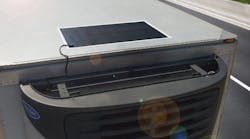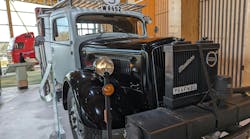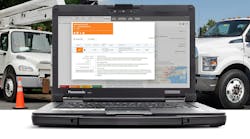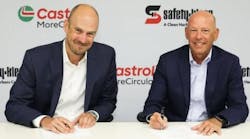Carrier Transicold has released a new accessory product that harnesses the sun’s power to charge transport refrigeration unit (TRU) batteries. Thin-film flexible solar panels are installed on the roofs of trailers, truck bodies and refrigerated rail cars to provide battery power to Carrier Transicold or other systems.
When exposed to daylight, the panels continuously charge TRU batteries, ensuring power for system starts and helping to avoid issues and costs associated with a weak or dead battery, the company said.
“The engineering specifications for many features of the Thin-Film Flexible Solar Panel systems were developed by Carrier Transicold experts who understand the unique power demands of TRUs and associated electrical architecture,” said Jason Forman, marketing manager – truck trailer, Carrier Transicold Performance Parts Group. “Refrigerated fleet demands for value-added electrical loads have increased in recent years, tapping refrigeration system batteries to power additional electronics such as telematics devices, fuel-level sensors, interior trailer lighting and other accessories.”
According to Carrier Transicold, power draws can range from milliamps to a few amps per hour, depending on the number of devices tied to the battery. If the TRU has not been operated for some time and these accessories continue to draw power while the unit is off, its battery might not have enough charge to start the engine, resulting in a service callout or battery replacement.
“Solar panels can offset the draw from accessory electrical devices while the TRU is off, significantly reducing callout charges related to the battery,” Forman said.
Carrier Transicold solar panels provide up to 1.8 amps per hour and are compatible with 12-volt wet cell and absorbent glass mat batteries. Amorphous silicon solar cell technology ensures the panels perform reliably even in low and indirect lighting conditions.
The panels weigh less than 2 lbs. and measure less than one-eighth of an inch thick. A standard panel measures approximately 26 by 41 in. and is intended for trailer and rail installations where there is a wide, flat roof. The rail-optimized panel is suited for narrow corrugated roofs, measuring approximately 14 by 80 in.



